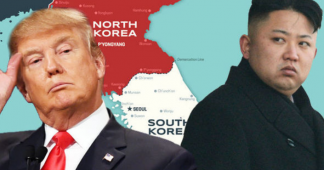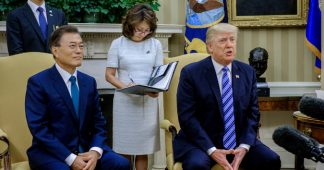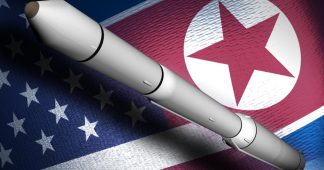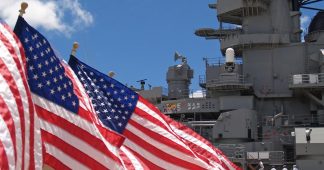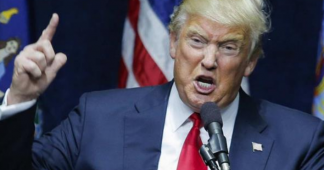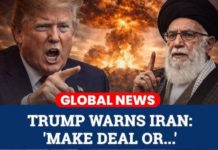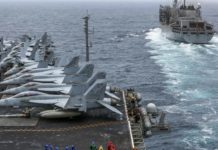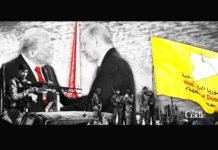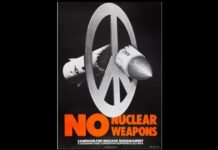By James Cogan
8 November 2017
President Donald Trump’s address to the South Korean National Assembly today was the latest in a long list of ultimatums, delivered by US administrations to a series of governments over the past 25 years, aimed at manufacturing a pretext for war. The 1991 Gulf War, the 1999 attack on Serbia, the 2001 invasion of Afghanistan and the 2003 invasion of Iraq—to name only the most prominent—were all preceded by demands that Washington knew would be rejected.
In line with his predecessors, Trump has likewise presented the North Korean regime, headed by Kim Jong-un, with demands that the White House anticipates will be dismissed out of hand.
Trump’s address was not, in any sense, intended to encourage or indicate a road to a peaceful solution to the stand-off over Pyongyang’s nuclear and missile programs. It was, instead, belligerent and provocative. North Korea was offered the choice of complete, unconditional surrender to American dictates, or total war.
Trump summed up Washington’s stance in the concluding section of his 32-minute speech, declaring:
“I also have come here to this peninsula to deliver a message directly to the leader of the North Korean dictatorship—the weapons you are acquiring are not making you safer. They are putting your regime in great danger. Every step you take down this dark path increases the peril you face. North Korea is not the paradise your grandfather envisioned. It is a hell that no person deserves. Yet despite every crime you have committed against god and man… we will offer a path towards a much better future. It begins with an end to the aggression of your regime, a stop to your development of ballistic missiles and complete verifiable and total denuclearisation.”
Pyongyang has repeatedly stated that it will not accept such terms, which amount to unilateral disarmament and the opening up of the country to intrusive and provocative US and UN weapons inspectors. North Korean representatives have, with some justification, pointed to the fate of the Iraqi and Libyan regimes, which submitted to similar US demands, only for their countries to be invaded and laid waste, and their leaderships hunted down and executed.
Trump, however, bluntly insisted that these were the only terms the US would discuss.
South Korea and its parliament have been used as the stage for a display of choreographed war propaganda. The US Navy arranged a rare joint exercise by three aircraft carrier battlegroups to coincide with Trump’s speech, to ensure that the president appeared against the backdrop of a massive show of the American military’s destructive firepower. The White House had intended that this would be preceded, this morning, by a provocative joint press conference, involving Trump and South Korean President Moon Jae-in, on the militarised border with North Korea. Bad weather, however, forced its cancellation, reportedly to Trump’s bitter disappointment.
The speech itself was reportedly drafted over several months, involving input from key members of Trump’s cabinet, such as Secretary of State Rex Tillerson and the generals who hold the key security posts in his administration. It was delivered just hours before Trump departed for a state visit to Beijing, in order, as CNN noted, “to lay down his views” to Chinese President Xi Jinping.
Xi and Trump will meet later today under conditions where the US president has declared he will order a full-scale war on China’s border if North Korea does not capitulate, or if it carries out another nuclear or long-range missile test.
“Do not underestimate us, do not try us,” Trump threatened. History, he continued, was full of “discarded regimes” that had come into conflict with the United States. His administration would “not permit” the US or its allies to be “blackmailed.” It would not allow “American cities to be threatened.”
Trump clearly signalled that he was prepared to authorise the use of nuclear weapons. In a particularly chilling sentence, he drew attention to the three US aircraft carrier battlegroups, “loaded to the maximum with F-35 and F-18 jet fighters.” He then ominously added: “Nuclear submarines are also appropriately positioned.” American Ohio-class submarines carry a payload of 24 ballistic missiles, each capable of delivering eight separate nuclear warheads.
There is little doubt that the media will pay considerable attention to the manner of Trump’s denunciation of the repressive character and actions of the North Korean regime.
The Stalinist apparatus in North Korea is, without any question, a reactionary dictatorship, which serves the interests of a corrupt elite and military officer caste. However, the claim made by Trump in his press conference yesterday that North Korea is a “worldwide threat” is a lie.
For the past 64 years, North Korea has not been involved in a military conflict, apart from skirmishes on its border with South Korea. American imperialism, in stark contrast, has waged dozens of intrigues, interventions and full-scale wars, slaughtering millions, decimating entire countries, overthrowing governments and installing puppet regimes.
Time and again, human rights abuses—both real and invented—have been used by the US imperialist propaganda machine to justify its predatory and neo-colonial operations, all of them aimed at protecting the profit interests of Wall Street and the strategic dominance of American capitalism, not the causes of “peace” and “democracy.”
The North Korean regime’s belief that in acquiring a handful of nuclear weapons it would forestall a US attack has certainly proven to be delusional. But it was a conclusion derived not only from the fate of Iraq and Libya, but also from the utter ruthlessness of the 1950–53 Korean War waged by US imperialism. Virtually every significant city in North Korea was reduced by the US to rubble; an estimated 1.5 million North Korean civilians were killed or wounded; and the tiny country’s military suffered at least 770,000 dead, wounded or missing.
The casualties and horrors of a second Korean War, in 2017, could make those of nearly 70 years ago pale in comparison.
North Korea is a country of barely 25 million people, with an economy that is 40 times smaller than that of South Korea and more than 600 times smaller than that of the US. A large proportion of its population lives a subsistence existence, with many stunted due to malnourishment as children—the result of famine and US-imposed sanctions. The country’s military is equipped with obsolete aircraft, air defenses and armoured vehicles, and is largely immobile due to a lack of fuel and spare parts. As in Iraq in 1991 and 2003, North Korean troop formations will be massacred by the US Air Force, in what its pilots call a “turkey shoot.”
Trump’s speech was as much as an ultimatum to Beijing and Moscow, both of which have been working through diplomatic channels to try and prevent a US attack on North Korea. Trump declared that the “time for excuses is over” and that the world “cannot tolerate a rogue regime.” Specifically naming China and Russia, he insisted that all countries must “isolate” North Korea, that they “cannot support it, cannot supply it” and they must “sever all ties of trade.”
Xi Jinping’s administration has counterposed to such US demands its own proposal. It has called for talks based on compromise from both sides, with Pyongyang suspending its weapons programs in return for the US ending its constant rehearsals with the South Korean military for an attack on North Korea. Trump’s speech in Seoul amounted to a categorical, non-negotiable rejection of China’s position.
The deliberate heightening of tensions ahead of Trump’s visit to Beijing only underscores the fact that the ultimate objective of Washington’s war drive against North Korea is to use military force to assert American dominance—above all, against the growing influence of China in Asia and around the world.
The question facing Chinese ruling circles over the next several days is whether they will stand aside if North Korea is attacked or issue their own ultimatum to the Trump administration that its position is unacceptable to Beijing.
